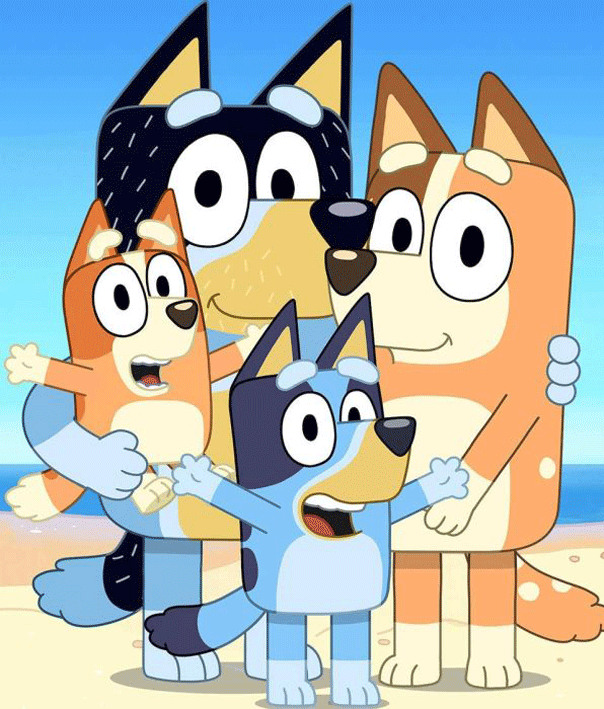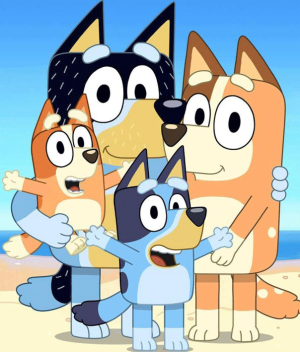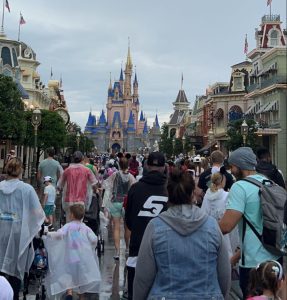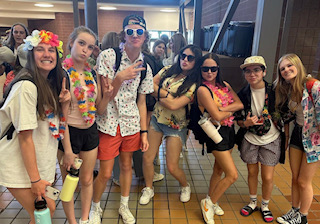Bluey: What Makes a Good Children’s Show?
February 22, 2023
As someone who babysits every week, I often end up watching the newest kids’ shows. One afternoon, Bluey was turned on instead of the usual Blippi or Daniel Tiger. Instead of just letting it play in the background, I got strangely invested and transfixed on the Australian cartoon. Bluey follows the adventures of a family of cartoon dogs: a mom named Chili, dad Bandit, and sisters Bluey and Bingo who are around 6 and 4 years old. Bluey premiered in 2018 and while it quickly became popular in Australia, it was slower to catch on in the US. But once it did, it had both kids and parents hooked. The cartoon is unlike any children’s show I have ever watched, both in my own childhood and when babysitting. So what makes it so different? Why has it hooked millions of viewers and intrigued parents as well as children?
The first thing I noticed after only watching a few episodes of Bluey was that the kids in the show felt like real kids. Not only are Bluey, Bingo, and their friends voiced by real kids, but they act realistically like children. Bluey and Bingo can often be selfish or annoying like kids can be, but they also demonstrate sympathy for others, remorse for their actions, and kindness as well as love towards their parents and friends. Bluey is also different in that the episodes are about simple, domestic, everyday life. The elaborate games the Heeler family plays together are what make the show. It demonstrates how hilarious yet crucial play can be for kids while also teaching parents how to play and engage with their children. Bandit and Chili are portrayed as parents who are constantly teaching their kids lessons, similar to other kids’ shows but are also realistic. Just like real parents they often make mistakes and when they do, they prioritize apologizing to Bluey and Bingo along with recognizing what they did wrong. In Sticky Gecko, for example, Chili becomes increasingly overwhelmed as she struggles to get her kids out of the door on time and eventually reaches a breaking point. However, eventually realizes that it’s ok to have these difficulties and that running late isn’t the end of the world. Many children’s shows portray perfect parent role models, yet Bluey actually speaks to the parents watching alongside their children: letting them know that it’s okay to mess up or feel complicated emotions towards parenting.
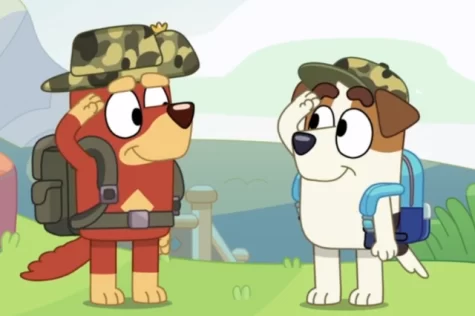
Bluey also allows kids who might feel different from others to see themselves represented on the screen. For instance, the episode Army follows Jack Russell (yes he is also a Jack Russell dog) on his first day at the school that Bluey also goes to. While it isn’t explicitly said, it is clear that Jack struggles with ADHD; he can’t sit still, isn’t good at doing what he’s told, and has issues remembering words and numbers. In the episode, Jack meets a new friend, Rusty, who teaches him how to play army. While Jack has struggles throughout the episode, such as forgetting his hat, he also has triumphant moments, such as when he finishes telling his mom about his day, and she compliments him on the amount of detail he was able to remember. As someone who also struggles with ADHD and has faced these same memory issues, this episode brought me to tears. Embracing inclusivity and recognizing mental or physical disabilities is something that children’s shows have only started doing in recent years. I think this is life-changing. Kids are extremely susceptible to their environment; they will pick up what happens around them. That’s why messages like these in kids’ shows are extremely important. As cliche as it is, Bluey tells kids that it’s okay to be who you are.
Another thing that keeps me watching Bluey is the nostalgic feeling it gives. Often, the shows or movies I watch have intense drama, violence, and high-tension situations. Bluey is an escape. It reminds me to relax, something I often struggle with. It also reminds me of the simple games from my childhood and my relationship with my sister growing up. I can relate to Bingo as she navigates the younger sibling experience. Sometimes I even relate to Bluey, or her friends. I think anyone who watches Bluey can see themselves in many characters and that’s part of what makes it so special. The relatability and nostalgia that Bluey creates are something that should be in more children’s shows. Bluey is something I wish I had growing up because it would have reflected my own imagination and showed me how to express myself It might have even given my parents some advice or at least some escape of their own. Overall, Bluey is a show I would recommend to kids, parents, and even teenagers.

